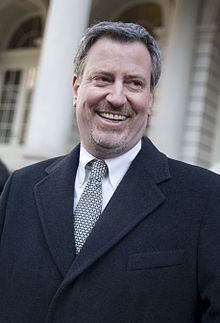By Arturo Ignacio Sánchez. Published in the hardcopy edition of QueensLatino.com
In a previous column, I suggested that the incoming de Blasio administration would be well served to include immigrant New Yorkers as full members in the post-electoral governing coalition. By doing so, mayor de Blasio could structure and mobilize a robust counter-weight to the interests favoring an economic minority over struggling New York majorities.
In making the case for structuring an expansive populist governing coalition, I
floated the notion that de Blasio’s reform agenda could secure crucial political support – especially in outer borough immigrant neighborhoods – by aggressively supporting two innovative political and civic initiatives: 1) non-citizen municipal voting rights; and 2) local participatory budgeting.
Both initiatives are in keeping with de Blasio’s goal of increasing the political and civic inclusion of our newest New Yorkers, and in strengthening the economic and social vitality of neighborhoods. And in a city long dominated by a top-down market-based orientation, these two inclusive projects can also be leveraged to mobilize the requisite support for a politically contentious reform agenda.
INTRO 410: This legislation – which is currently before the New York City Council – would grant documented non-citizen residents, who have lived in New York City for at least six months, with the right to vote in New York’s municipal elections.
At present, more than 1.3 million adult immigrant New York residents cannot vote in the local elections that structure their life chances and those of their children.
This inequitable scenario is compounded by the crucial financial contributions
that immigrants make to the local and regional economy. Documented immigrants pay $18.2 billion in taxes, which represents 15.5% of New York State’s income tax receipts. The lack of immigrant voting rights violates the principle of no taxation without representation.
Currently Intro 410 has the necessary votes to pass the legislation and to over-
ride a mayoral veto. In effect, the bill’s passage would open, expand, and transform the city’s electoral ecology. And while Intro 410 will make the political processes more inclusive, it will also destabilize the current ethnic and racial electoral landscapes. And in the midst of this emerging political flux, the challenge for the de Blasio administration will hinge on the following: How to establish a successful governing coalition that includes new immigrant voters – while maintaining the support of racial and ethnic groups – that have concerns regarding the changing electoral landscape.
Candidate de Blasio has, nonetheless, voiced public reservations regarding non-citizen voting rights. Yet, considering the numerical scale of the enhanced voter base, it seems plausible that the incoming mayor might include the newly enfranchised immigrant voters within his governing coalition. Non-citizen voters represent, after all, a sympathetic political constituency that could be mobilized in support of his reform agenda.
PARTICIPATORY BUDGETING: Participatory budgeting (PB) is a novel and deliberative decision-making process that civically empowers local residents – who live in the district and are at least 16 years of age – in determining how a portion of the local capital budget is allocated within their neighborhood.
During the 2011/2012 budget cycle, four New York City Council members adopted the PB process within their respective councilmanic districts and allocated one million dollars apiece from their discretionary funds. Across the four councilmanic districts, a host of diverse projects were suggested by a cross section of community residents. Projects approved, to just mention a few, included emergency equipment for a Volunteer Ambulance Corps, street greening initiatives, and upgrades in educational technology. Riding on the success of the PB 2011/12 budget cycle the project was expanded, during the current 2013/2014 budget cycle, to nine City Council members.
In a city of immigrant neighborhoods, local residential engagement in the PB process represents an expansion in community participation and a deepening of democracy. In the short- and long-term, PB decentralizes the budgetary decision-making process to the local councilmanic level, increases neighborhood stakeholders, scales up immigrant incorporation, fosters face-to-face interaction, and accelerates the growth of social and civic networks. In short, PB represents an innovative form of bottom-up urban governance. It also provides immigrants and other marginalized populations with a venue for neighborhood claim making – the emblematic signature of a decentralized democracy.
The PB initiative added significant value to a diverse set of neighborhoods. Local administrative practices, in effect, have begun to shift from bureaucratic top-down managerialism to bottom-up forms of civic engagement. These forms of value added civic and political practices could serve to inform, define and mobilize the de Blasio governing coalition.
Local participatory budgeting and non-citizen municipal voting rights are progressive initiatives that will have far reaching repercussions for the future of the city and its foreign-born residents. As such, these innovative projects should play a strategic role in structuring an effective governing coalition and in dismantling the tale of two cities while erecting the socially just city.
Arturo Ignacio Sánchez, Ph.D. is chairperson of the Newest New Yorkers Committee of Community Board 3, Queens. He has taught contemporary immigration, entrepreneurship and urban planning at Barnard College, City University of New York, Columbia University, Cornell University, and Pratt Institute.










